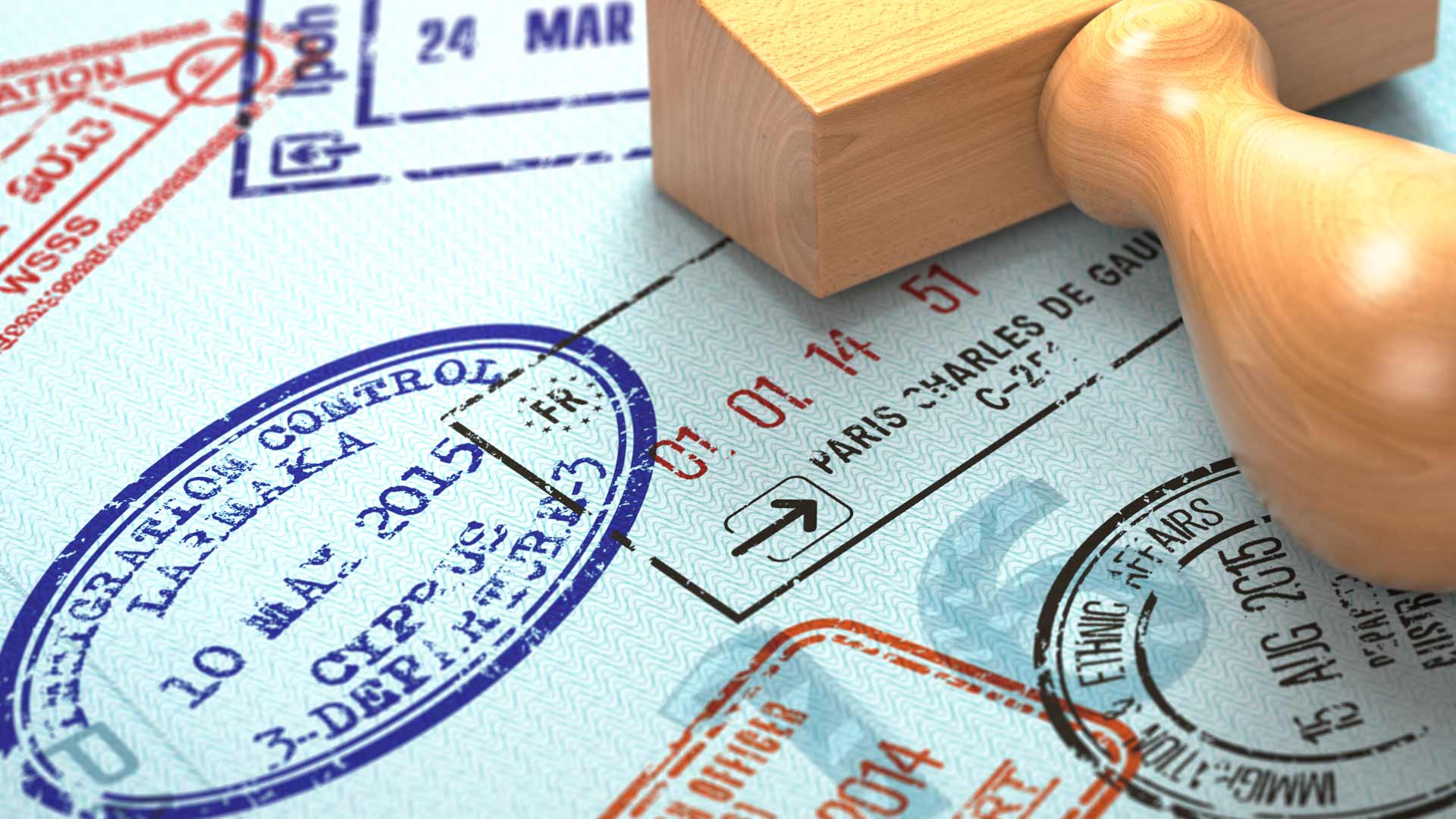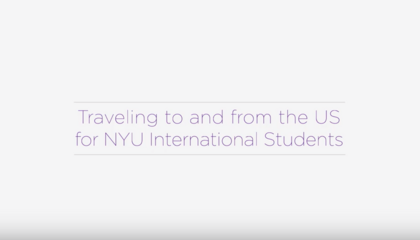
Quick Links
Travel & Visitors
Going home for the summer or planning a trip for spring break? Want to invite family members for a visit? You can find everything you need to know on traveling and reentering the US as an F-1 or J-1 student and helping family members come for a visit. And remember, the US government determines your and any family member's eligibility to enter the US. Be prepared and have the needed travel documents with you.
Get a New Travel Signature
Getting a travel signature from an OGS advisor is easy. If the signature on your I-20 or DS-2019 will be more than a year old by the time you reenter the US, you need to get a new signature before you travel. For students on post-completion Optional Practical Training, the travel signature is only valid for six months. And remember, the US government determines your eligibility to enter the US. Be prepared and have the needed travel documents with you. Find out how to get a new travel signature.
International Visitors
You do not need any letter or document from the OGS to invite a family member as a B2 visitor. If you wish to invite family members, other than your spouse or child, to visit the United States for a short time on a B2 visitor visa, review the documentation that you need here.
International Visa Requests for Graduation
International guests who plan to attend the Commencement ceremony may need to apply for a U.S. Visitor Visa (B-2).
Information about applying for a visa is available at the U.S. Embassy or Consulate where the visa application will be made. Applications will need to show that the visit to the U.S. is temporary, that there are adequate finances to cover the trip, and that they intend to return to their home country (proof of ties such as job, family, property or other commitments).
Find out what supporting evidence you may need for your guest(s).
Please note that family members from certain countries may be eligible to visit the U.S. for up to 90 days without obtaining a B-1/B-2 visa through the U.S. Department of State Visa Waiver Program.
I-94 Record
The I-94 is an official US government record of when you enter and depart the United States. Your I-94 record confirms what immigration status you entered the United States in, and the duration of time you can legally remain in the US.
Find out:
- How to get, review and print your I-94 record
- How to Locate Your I-94 Record
- Instructions to Correct Problems with the I-94
Travel without Required Documents (Don’t do it!)
Didn’t have all your documents with you when you last entered the US as an international student? Received an I-515A from the officer at the immigration check? Find out what to do now if you received an I-515A at the border.
Visas for NYU Study Abroad
Studying abroad at another NYU location? Find out if you need a visa, how to get one, and what else you need to know by visiting this page.
Travel Monitor Program
Recent policy changes from the US federal government have made travel more difficult for some members of our community. The federal government has also adopted more rigorous policies on questioning non-US citizens at the border. As a result, non-US citizens may face extra scrutiny at the border.
In response to these changes, the NYU Immigrant Defense Initiative (IDI) and the NYU Office of Global Services (OGS) collaborated with NYU Departments of Public Safety and Information Technology to create the NYU Travel Monitor Program, which provides security and support for members of the community passing through US ports of entry.
Find out what the NYU Travel Monitor Program is and how to use it.
Travel for International Student Alumni
Are you an international student on post-completion OPT or Academic Training? Traveling outside of the US soon and need to reenter the US without a problem? Avoid a long wait in the airport immigration office by having these needed documents with you.
Learn about the documents you need to carry with you.
If you do not plan to use your post-completion Optional Practical Training (OPT) or your Academic Training, traveling outside of the US after graduation is not possible. Learn about traveling during the grace period.
Visa, Academic, & Status Changes
As an international student, US law requires you to notify the Office of Global Services if anything changes with your academic program or immigration status.
Read on to find out about the most common changes and what you need to do in these circumstances.
Visa Changes
A) Change to F-1 or J-1 Status | If you are presently in the United States in a non-immigrant status (such as H-4, A-1, or L-2 status), you may be able to study in your current status. Find out if you can study at NYU under your current status. You may, however, want or need to change to F-1 or J-1 status in order to complete your degree at NYU. For more information visit this page.
B) Regain Your Status | Loss of status for an international student results in your immediate termination of eligibility for such immigration benefits as employment, extension, transfer, or travel signature recertification. Once out of status, you must take prompt action to get back into lawful status in order to regain eligibility for immigration benefits. Any delay in doing this could result in serious, possibly permanent immigration consequences for you. In addition to using the Office of Global Services as a resource, we encourage you to consult with NYU's Immigrant Defense Initiative and with a qualified immigration attorney. OGS has an attorney list we could provide to you as a resource for further expert guidance. For more information visit this page.
C) Renew Your US Visa | If your visa has expired, you need to get a new visa from a US consulate or embassy outside of the US. You can’t apply for a new visa inside the US. Find out how to renew your visa and be prepared for the process.
D) Replace Lost Immigration Documents | Please review here the guidelines to follow for Stolen or Lost Passport.
E) New Immigration Status | Have you recently filed or been approved for a new immigration status and need to end your F-1 or J-1 record with NYU? Consult this page.
F) Effect of Arrest on Immigration Status | Wondering what kind of effect an arrest could have on your visa for or legal status within the US? Consult this page.
Academic Changes
A) Register Part-Time: Reduced Course Load | All F-1 and J-1 international students must register full-time every semester or receive permission from OGS for a reduced course load (RCL), which is anything less than full-time registration.
You are eligible for a reduced course load if:
- It is your last semester before you graduate and you have fewer than 12 credits left to finish your degree or program.
- It is your first semester in the US, and your department recommends English-language courses in addition to your studies.
- You have a medical condition requiring you to take a leave of absence or a reduced course load. For permission to register less than full-time due to a medical reason, please follow the instructions for Medical Leave of Absence or Reduced Course Load.
Consult this page to learn how to apply.
B) Extend Your Study | As an international student, you are granted a specific period of time to complete your degree requirements. You must complete your degree by the completion date listed on your I-20 or DS-2019. If you are unable to finish your degree requirements by that date, you must apply for a program extension before your current document expires.
Consult this page to learn how to apply.
C) Take a Leave of Absence | Need to take a personal or medical leave of absence from your studies at NYU? As an international student, if you decide to take a leave of absence, withdraw from your program, or are given a suspension, you must contact the OGS immediately to discuss your immediate plans and any plans you may have to return. A personal or medical leave of absence can impact your eligibility for F-1 or J-1 benefits such as CPT, OPT, or Academic Training.
Unless you have a medical condition that requires you to take a full or partial leave, if you will register for even one course during the Fall or Spring semester, you instead need to review how you can get permission to register for a reduced course load.
If you plan to take a leave of absence, review NYU's policy on Leave of Absence and Term/Total Withdrawals to learn more about things you should consider and understand before taking any leave.
Find all the details on how to take and return from a leave of absence depending on your situation:
- Personal Leave of Absence | This kind of leave includes military duty, or taking a leave for any other personal reason.
- Medical Leave of Absence or Medical Reduced Course Load | This kind of leave or reduced course load is for any physical or mental health condition for which a health professional advises you to take a full or partial leave from your studies.
- Returning from a Personal Leave of Absence
D) Change Major or Degree | Consult this page to learn how to apply.
E) Transfer out of NYU | If you are an international student who wants to transfer from NYU to another school, you must request the OGS to release your SEVIS record to your new institution. Consult this page to learn how to apply.
